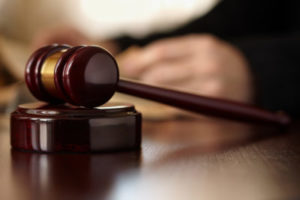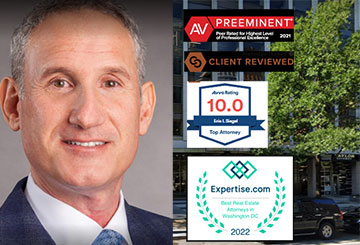Commercial Litigation Lawyer Washington DC
 The SITUATION:
The SITUATION:
Businesses and individuals enter into contracts on a daily basis – to make money, increase reputation, provide a better service or product than a competitor, and to forge relationships to produce success, financial or otherwise. Contracts are in place to govern the parties’ business relationship. Business, however, is not conducted in a vacuum; commerce occurs when other businesses or consumers participate, as a Commercial Litigation Lawyer can explain.
What could go WRONG:
The parties to the contract have a disagreement over the running of the business or decisions that need to be made to grow it. In many cases, the contract terms resolve those disputes with clear language. Unfortunately, some contracts fall short either by not addressing the given problem or by offering ambiguous language that entrenches each party’s position. These deficiencies escalate the conflict, potentially leaving many issues, questions and answers unresolved:
- How are “major decisions” between the parties made? Who breaks a tie? What dispute mechanisms are in place to assist the parties in a friendly setting to resolve those differences?
- What if one or both parties breaches the contract? What if there is no provision that gives the breaching party a chance to cure the breach? The non-breaching party may be damaged, or not.
- What if a third party comes calling on one of the parties and seeks to replace the other contracting party in order to gain business and customers?
- What if the parties’ relationship sours over time such that one party wants out of the contract?
- Circumstances change. Are there contract provisions that govern dissolution of the business, death or disability of a partner, transfer or sale of the business?
- In many industries, there are also standards of care that must be followed in carrying out business or in pursuing and maintaining business relationships. What if those standards of care are violated?
The RIGHT CHOICE:
I have encountered these situations many times, both as a businessperson and as a Commercial Litigation Lawyer representing businesses and owners. An injured client has recourse for a business relationship gone wrong or where a breaching party or third party has caused injury. Frequently asserted common law claims may include:
- Breach of contract
- Unjust enrichment claim
- Tortious interference with contract
- Tortious interference with business relationship
- Breach of fiduciary duty
- Negligent misrepresentation
- Fraud or fraudulent misrepresentation
- Defamation (damage to reputation by knowingly false statements)
- In the context of professions such as law or medicine, a partner may be brought to task for malpractice in handling a client’s claims or medical issues.
- Misappropriation of confidential information
- Unfair competition claim
- Conversion of property and/or confidential information
In addition to common law claims, there may be available statutory claims to protect businesses, creditors and clients from harm, depending on the circumstances. Examples of such statutory claims include:
- A State’s Consumer Protection statutes
- A State’s Uniform Commercial Codes
- A State’s Uniform Trade Secrets Act
- Computer Fraud and Abuse Act, 18 U.S.C. § 1030
- Defend Trade Secrets Act of 2016, 18 U.S.C. § 1831, et seq.
The Right Choice begins with exploring what claims you may have, and how you can best resolve them.
5 Frequently Asked Questions for Commercial Litigation Lawyers
If you’re new to the world of commercial litigation, it can be hard to know where to start when looking for legal representation. This guide covers some of the most frequently asked questions by potential clients who are seeking commercial litigation lawyers and want to know more about what they can expect as their attorney does their work on their behalf. When it comes time to choose your commercial litigation lawyer, these five frequently asked questions will help you decide if that lawyer is right for you and your needs.
1. What Is Commercial Litigation?
Commercial litigation is a type of civil lawsuit that arises out of disputes between businesses. These disputes can involve contracts, tortious interference, breach of fiduciary duty, and other business-related claims. Commercial litigation can be expensive and time-consuming, so it’s important to have a clear understanding of the process before you get started.
2. How Do I Know If My Case Qualifies?
The answer to this question depends on the type of case you have. If you have a contract dispute, for example, you will need to look at the contract itself to see if there is a clause that allows for arbitration or mediation. If you have been injured, you will need to look at the law to see if you meet the requirements for filing a personal injury lawsuit. An experienced commercial litigation lawyer can help you determine if your case qualifies.
3. What Are The Benefits Of Working With A Qualified Commercial Litigation Lawyer?
There are many benefits of working with a qualified commercial litigation lawyer. First, they can help you navigate the legal system and ensure that your rights are protected. Second, they can help you understand the complex legal issues involved in your case. Third, they can help you develop a strong legal strategy and present your case in the best light possible. Fourth, they can help you negotiate with the other party and reach a fair settlement. Finally, they can represent you in court if necessary and fight for a favorable outcome.
4. How Long Does It Take To Go To Trial?
The answer to this question depends on the specific facts of your case. Generally, it takes anywhere from several months to a year or more to go to trial. The amount of time it takes also depends on the court’s schedule and whether the parties can agree on a settlement, and if you lose at trial, you may have to pay the other party’s costs and attorney’s fees. These expenses could include attorneys’ fees, deposition costs, expert witness fees, etc. It is important to consult with an experienced lawyer before you agree to any settlements so that you are fully aware of what the risks are and what they mean for your individual situation.
5. Do I Need An Attorney For Meetings With Others Involving My Case?
It is generally in your best interest to have legal representation during this meeting. This is because the attorney can help you understand the nature of the case and what to expect going forward. Additionally, the lawyer can help ensure that you do not say anything that could potentially harm your case. For example, if someone were to ask you how much money you want as compensation, it is imperative that an attorney be present so they can answer on your behalf.
Contact a lawyer at Eric Siegel Law today!

 The SITUATION:
The SITUATION:
